- Kerry cites U.S. commitment to Ukraine's sovereignty
- Kerry says Russia tries to create a false pretext to further invade Ukraine
- $1 billion aid package announced as U.S. considers sanctions against Russia
- NEW: President Obama says there is a strong belief globally that Russia has violated international law
Kiev, Ukraine (CNN) -- Secretary of State John Kerry forcefully denounced Russia for trying to create a pretext to further invade Ukraine, and he pledged U.S. commitment to Ukrainian sovereignty and territorial integrity after announcing $1 billion in loan guarantees for the new government.
The United States "will stand by the Ukrainian people," Kerry told reporters in Kiev after accusing Moscow of making up reasons for sending troops into the Crimea region based on alleged persecution of Russian speakers and native Russians.
"Not a single piece of credible evidence supports any one of these claims," Kerry said, adding that it was clear "that Russia has been working hard to create a pretext to invade further" in Ukraine.
In Washington, President Barack Obama again denounced the use of force and said there is a strong belief around the world that Russia is violating international law.
"I know (Russian) President (Vladimir) Putin seems to have a different set of lawyers making a different set of interpretations but I don't think that's fooling anybody I think everybody recognizes that although Russia has legitimate interests in what happens in a neighboring state that does not give it the right to use force as a means of exerting influence inside of that state," Obama said.
Kerry said the United States prefers for Russia to de-escalate the crisis, but if that doesn't happen, "then our partners will have absolutely no choice (but) to join us to continue to expand on steps we have taken in recent days to isolate Russia diplomatically, politically and economically."
The loan guarantees will help Ukraine move forward with an assistance package from the International Monetary Fund, which is calling for the country to raise energy prices.
Kerry arrived Tuesday in the Ukrainian capital to show American support for the fledgling government.
While condemning the Russian show of force, which Kerry said was "not 21st Century, G8, major nation behavior," he also offered a way out by calling for Russia to call troops in Crimea back to their barracks and allow international observers to monitor the situation.
Obama administration officials traveling with Kerry said Treasury Department technical advisers would travel to Ukraine to help its national bank and finance ministry deal with economic challenges and implement energy sector reforms.
The United States also will train observers for the May 25 elections, and is sending a team of experts to help identify stolen assets and support anti-corruption measures.

 U.S. Secretary of State John Kerry, wearing a blue scarf, visits a shrine Tuesday, March 4, for the people who were killed during anti-government protests in Kiev, Ukraine, last month.
U.S. Secretary of State John Kerry, wearing a blue scarf, visits a shrine Tuesday, March 4, for the people who were killed during anti-government protests in Kiev, Ukraine, last month.  Yuli Mamchun, the commander of the Ukrainian military garrison at the Belbek air base near Sevastopol, Ukraine, salutes on March 4.
Yuli Mamchun, the commander of the Ukrainian military garrison at the Belbek air base near Sevastopol, Ukraine, salutes on March 4.  Ukrainian military members march at the Belbek air base on March 4.
Ukrainian military members march at the Belbek air base on March 4.  Russian soldiers fire warning shots to keep back Ukrainian military members at the Belbek air base on March 4.
Russian soldiers fire warning shots to keep back Ukrainian military members at the Belbek air base on March 4.  A Ukrainian airman puts the Ukrainian national flag over the gate of the Belbek air base as they guard what's left under their control on March 4.
A Ukrainian airman puts the Ukrainian national flag over the gate of the Belbek air base as they guard what's left under their control on March 4.  Russian soldiers aim a grenade launcher and machine gun as they guard positions at the Belbek air base on March 4.
Russian soldiers aim a grenade launcher and machine gun as they guard positions at the Belbek air base on March 4.  Ukrainian seamen stand guard on the Ukrainian navy ship Slavutich in the Sevastopol harbor on Monday, March 3.
Ukrainian seamen stand guard on the Ukrainian navy ship Slavutich in the Sevastopol harbor on Monday, March 3.  Oleg, a Ukrainian soldier, kisses his girlfriend Svetlana through the gates of the Belbek base entrance on March 3. Tensions are high at the base, where Ukrainian soldiers were standing guard inside the building while alleged Russian gunmen were standing guard outside the gates.
Oleg, a Ukrainian soldier, kisses his girlfriend Svetlana through the gates of the Belbek base entrance on March 3. Tensions are high at the base, where Ukrainian soldiers were standing guard inside the building while alleged Russian gunmen were standing guard outside the gates.  Armed men in military uniform walk outside a Ukrainian military unit near Simferopol, Ukraine, on Sunday, March 2. Hundreds of armed men in trucks and armored vehicles surrounded the Ukrainian base Sunday in Crimea, blocking its soldiers from leaving.
Armed men in military uniform walk outside a Ukrainian military unit near Simferopol, Ukraine, on Sunday, March 2. Hundreds of armed men in trucks and armored vehicles surrounded the Ukrainian base Sunday in Crimea, blocking its soldiers from leaving.  Soldiers walk outside a Ukrainian military base in Perevalne, Ukraine, as a local resident waves a Russian flag March 2.
Soldiers walk outside a Ukrainian military base in Perevalne, Ukraine, as a local resident waves a Russian flag March 2.  Demonstrators shout during a rally in Kiev's Independence Square on March 2.
Demonstrators shout during a rally in Kiev's Independence Square on March 2.  Ukrainian soldiers, left, and unidentified gunmen, right, stand at the gate of an infantry base in Perevalnoye, Ukraine, on March 2.
Ukrainian soldiers, left, and unidentified gunmen, right, stand at the gate of an infantry base in Perevalnoye, Ukraine, on March 2.  Ukrainian soldiers guard a gate of an infantry base in Perevalnoye on March 2.
Ukrainian soldiers guard a gate of an infantry base in Perevalnoye on March 2.  A woman cries during a rally in Independence Square on March 2.
A woman cries during a rally in Independence Square on March 2.  Protesters hold flags of the United States, Germany and Italy during a rally in Independence Square on March 2.
Protesters hold flags of the United States, Germany and Italy during a rally in Independence Square on March 2.  People attend a morning prayer service at Independence Square on March 2.
People attend a morning prayer service at Independence Square on March 2.  Heavily armed troops, displaying no identifying insignia and who were mingling with local pro-Russian militants, stand guard outside a local government building in Simferopol, Ukraine, on March 2.
Heavily armed troops, displaying no identifying insignia and who were mingling with local pro-Russian militants, stand guard outside a local government building in Simferopol, Ukraine, on March 2. 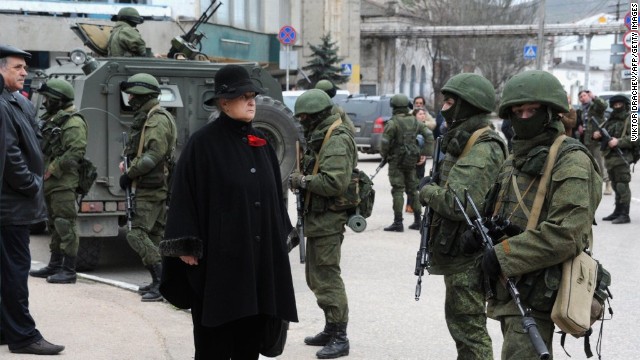 A woman waits in front of unidentified men in military fatigues who were blocking a base of the Ukrainian frontier guard unit in Balaklava, Ukraine, on Saturday, March 1.
A woman waits in front of unidentified men in military fatigues who were blocking a base of the Ukrainian frontier guard unit in Balaklava, Ukraine, on Saturday, March 1. 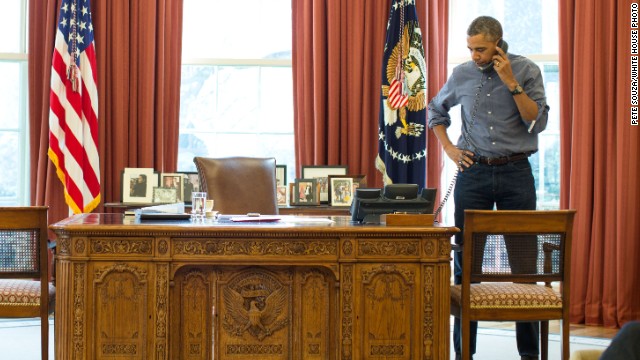 U.S. President Barack Obama, in the Oval Office of the White House, talks on the phone March 1 with Russian President Vladimir Putin.
U.S. President Barack Obama, in the Oval Office of the White House, talks on the phone March 1 with Russian President Vladimir Putin. 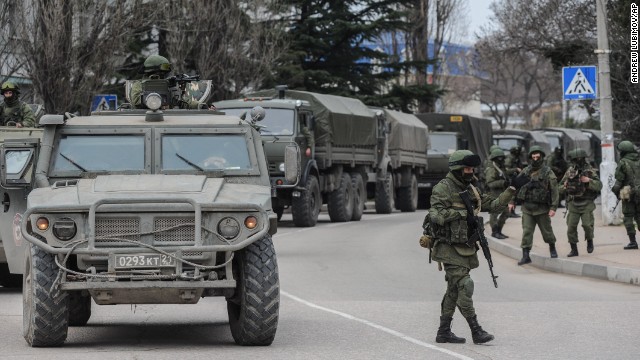 Troops stand guard in Balaklava on March 1.
Troops stand guard in Balaklava on March 1. 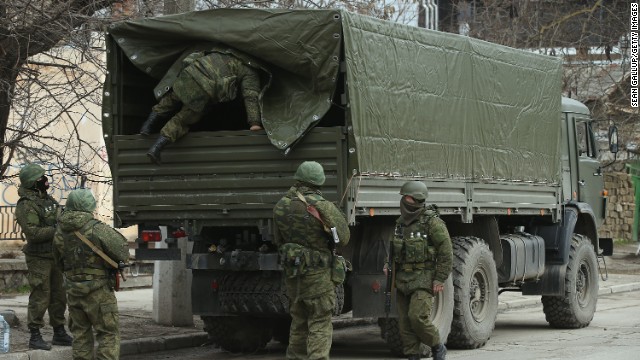 Heavily armed soldiers displaying no identifying insignia maintain watch in Simferopol, Ukraine, on March 1.
Heavily armed soldiers displaying no identifying insignia maintain watch in Simferopol, Ukraine, on March 1. 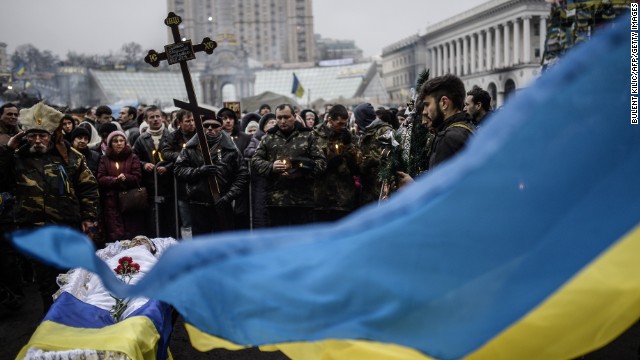 People gather around the coffin of a man who was killed during clashes with riot police in Independence Square.
People gather around the coffin of a man who was killed during clashes with riot police in Independence Square.  Pro-Russian activists hold Russian flags during a rally in the center of Donetsk, Ukraine, on March 1.
Pro-Russian activists hold Russian flags during a rally in the center of Donetsk, Ukraine, on March 1. 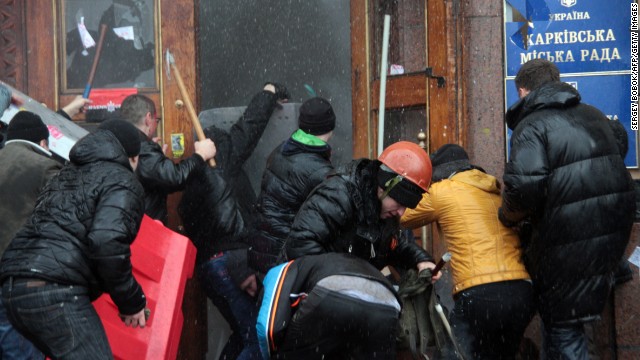 Pro-Russian activists clash with Maidan supporters as they storm the regional government building in Kharkiv, Ukraine, on March 1.
Pro-Russian activists clash with Maidan supporters as they storm the regional government building in Kharkiv, Ukraine, on March 1. 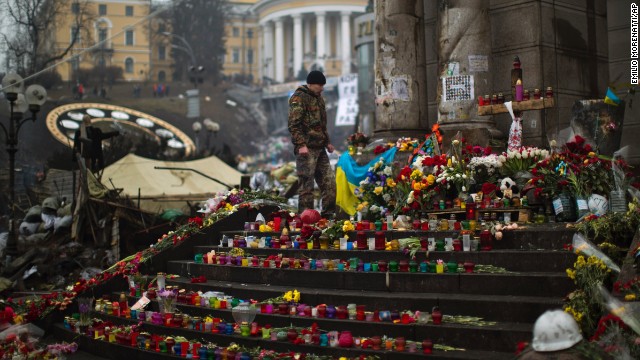 A protester stands at a memorial March 1 for the people killed in clashes at Independence Square.
A protester stands at a memorial March 1 for the people killed in clashes at Independence Square. 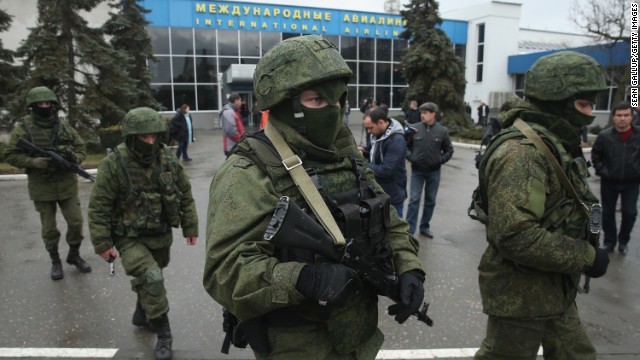 Armed men patrol outside the Simferopol International Airport in Ukraine's Crimea region on Friday, February 28. Simferopol is the regional capital.
Armed men patrol outside the Simferopol International Airport in Ukraine's Crimea region on Friday, February 28. Simferopol is the regional capital. 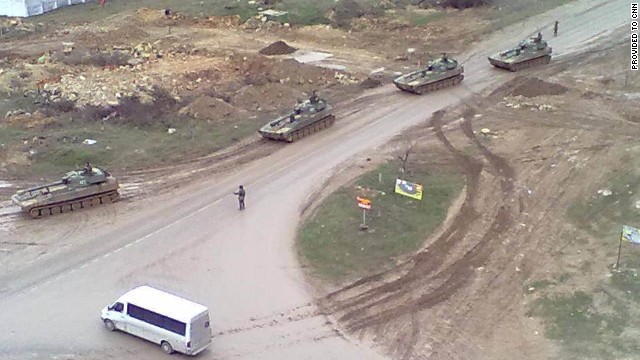 An image provided to CNN by a local resident shows Russian tanks on the move in Sevastopol, Ukraine.
An image provided to CNN by a local resident shows Russian tanks on the move in Sevastopol, Ukraine. 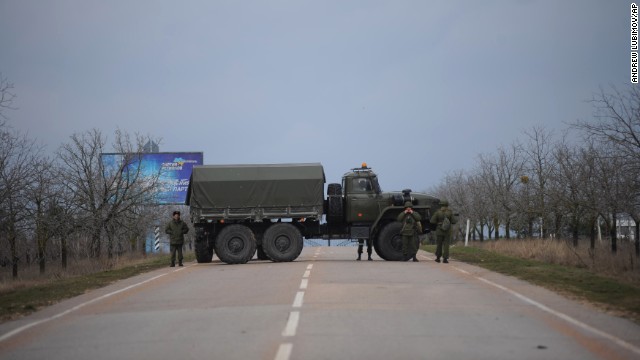 Russian troops block a road February 28 toward the military airport in Sevastopol, Ukraine. The Russian Black Sea Fleet is based at the port city of Sevastopol.
Russian troops block a road February 28 toward the military airport in Sevastopol, Ukraine. The Russian Black Sea Fleet is based at the port city of Sevastopol. 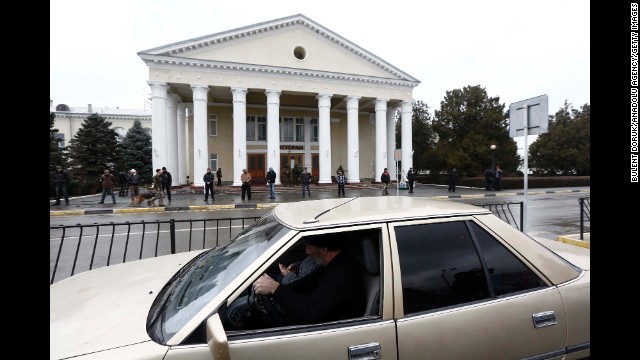 Armed men stand guard in front of a building near the Simferopol airport on February 28.
Armed men stand guard in front of a building near the Simferopol airport on February 28. 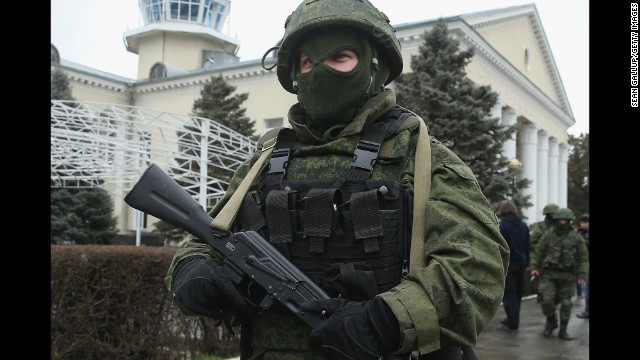 An armed man wearing no identifying insignia patrols outside Simferopol International Airport on February 28.
An armed man wearing no identifying insignia patrols outside Simferopol International Airport on February 28. 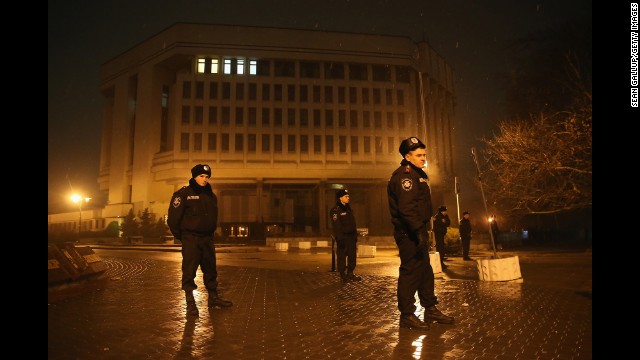 Police stand guard outside the Crimea regional parliament building Thursday, February 27, in Simferopol. Armed men seized the regional government administration building and parliament in Crimea.
Police stand guard outside the Crimea regional parliament building Thursday, February 27, in Simferopol. Armed men seized the regional government administration building and parliament in Crimea. 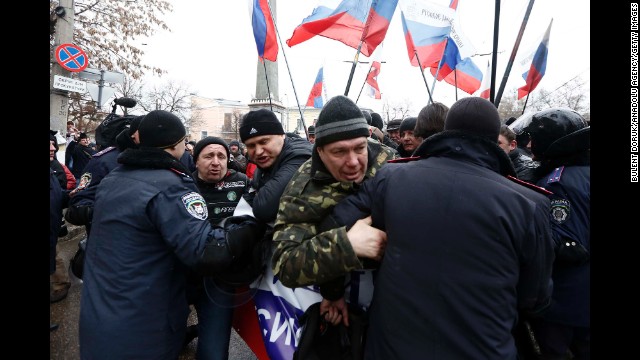 Police intervene as Russian supporters gather in front of the parliament building in Simferopol on February 27.
Police intervene as Russian supporters gather in front of the parliament building in Simferopol on February 27. 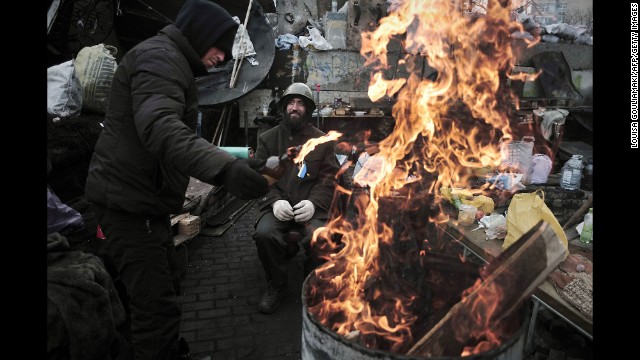 A man adds fuel to a fire at a barricade in Independence Square on February 27. Dozens of people were killed last week during clashes between security forces and protesters.
A man adds fuel to a fire at a barricade in Independence Square on February 27. Dozens of people were killed last week during clashes between security forces and protesters. 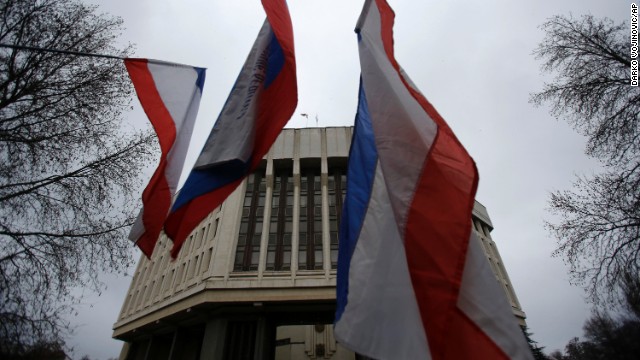 Pro-Russia demonstrators wave Russian and Crimean flags in front of a local government building in Simferopol on February 27.
Pro-Russia demonstrators wave Russian and Crimean flags in front of a local government building in Simferopol on February 27.  Barricades in front of a government building in Simferopol on February 27 hold a banner that reads: "Crimea Russia." There's a broad divide between those who support the pro-Western developments in Kiev and those who back Russia's continued influence in Crimea and across Ukraine.
Barricades in front of a government building in Simferopol on February 27 hold a banner that reads: "Crimea Russia." There's a broad divide between those who support the pro-Western developments in Kiev and those who back Russia's continued influence in Crimea and across Ukraine. 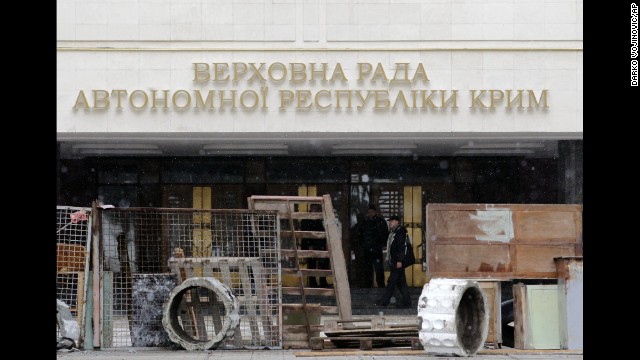 Protesters stand in front of a government building in Simferopol on February 27. Tensions have simmered in the Crimea region since the Ukrainian president's ouster.
Protesters stand in front of a government building in Simferopol on February 27. Tensions have simmered in the Crimea region since the Ukrainian president's ouster. 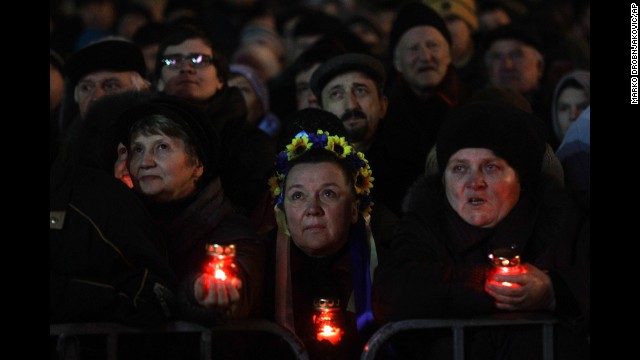 Protesters in support of the president's ouster rally in Independence Square, which has been the center of opposition, on Wednesday, February 26.
Protesters in support of the president's ouster rally in Independence Square, which has been the center of opposition, on Wednesday, February 26. 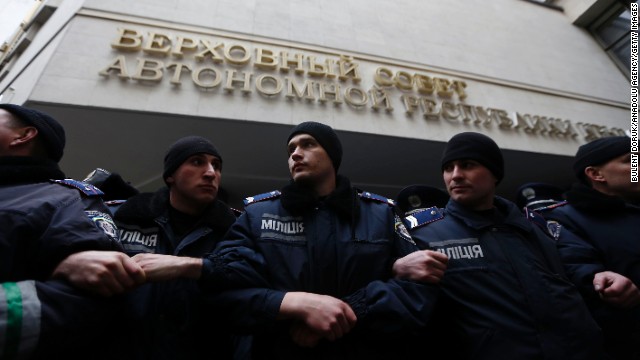 Security forces stand guard during clashes between opposing sides in front of Crimea's parliament building in Simferopol on February 26.
Security forces stand guard during clashes between opposing sides in front of Crimea's parliament building in Simferopol on February 26. 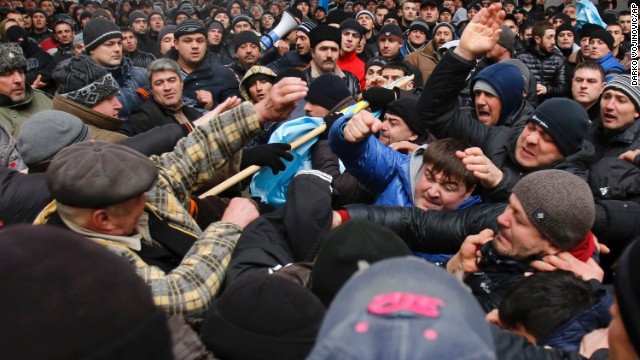 Pro-Russian demonstrators, right, clash with anti-Russian protesters in front of a government building in Simferopol on February 26.
Pro-Russian demonstrators, right, clash with anti-Russian protesters in front of a government building in Simferopol on February 26. 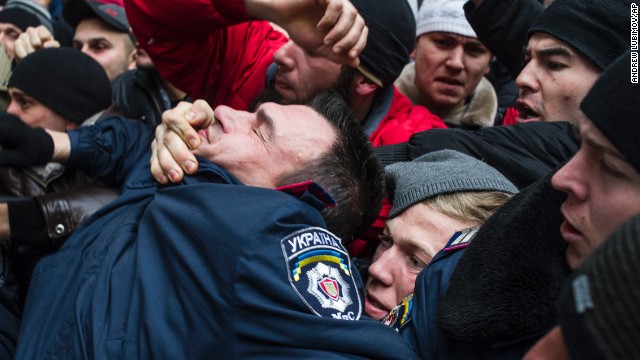 A police officer gets pulled into a crowd of Crimean Tatars in Simferopol on February 26. The Tatars, an ethnic minority group deported during the Stalin era, is rallying in support of Ukraine's interim government.
A police officer gets pulled into a crowd of Crimean Tatars in Simferopol on February 26. The Tatars, an ethnic minority group deported during the Stalin era, is rallying in support of Ukraine's interim government.  A man places flowers at a barricade near Independence Square on February 26.
A man places flowers at a barricade near Independence Square on February 26. 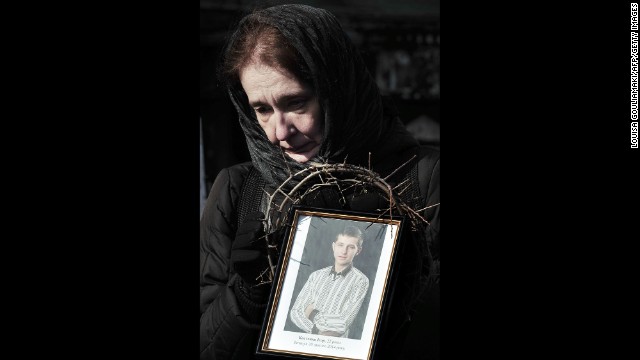 On February 26 in Kiev, A woman holds a photograph of a protester killed during the height of tensions.
On February 26 in Kiev, A woman holds a photograph of a protester killed during the height of tensions. 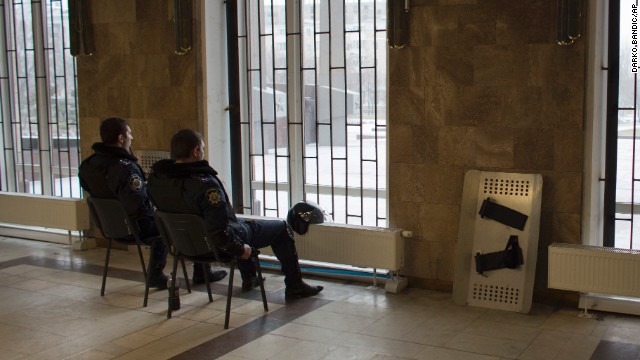 Police guard a government building in Donetsk on February 26.
Police guard a government building in Donetsk on February 26.  Protesters remove a fence that surrounds Ukraine's parliament in Kiev on February 26.
Protesters remove a fence that surrounds Ukraine's parliament in Kiev on February 26. 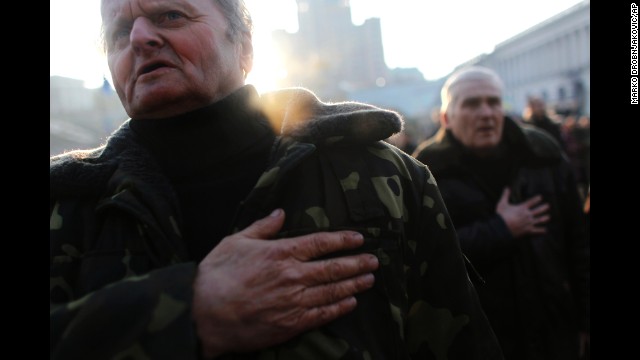 People sing the Ukrainian national anthem at Independence Square on Monday, February 24.
People sing the Ukrainian national anthem at Independence Square on Monday, February 24. 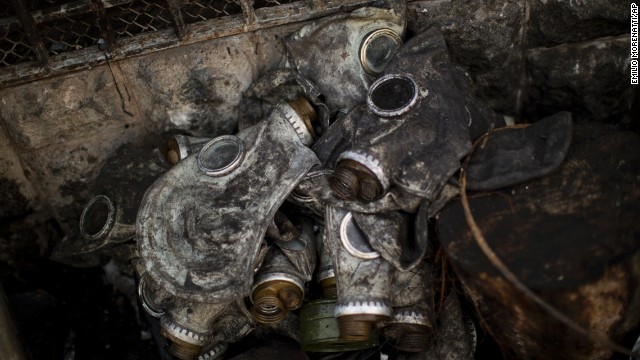 Gas masks used by protesters sit next to a barricade in Independence Square on February 24.
Gas masks used by protesters sit next to a barricade in Independence Square on February 24. 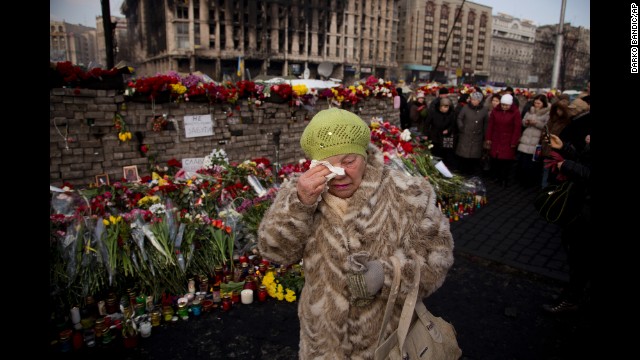 A woman cries February 24 near a memorial for the people killed in Kiev.
A woman cries February 24 near a memorial for the people killed in Kiev. 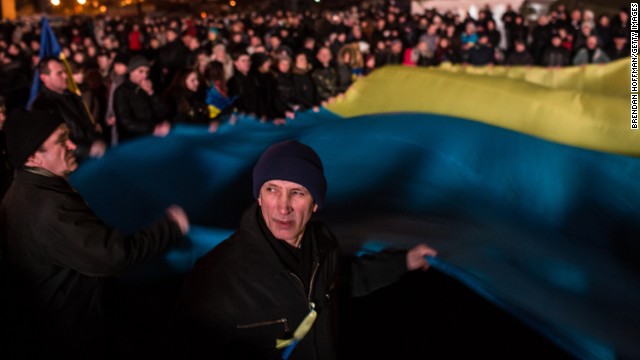 People wave a large Ukrainian flag in Independence Square on Sunday, February 23.
People wave a large Ukrainian flag in Independence Square on Sunday, February 23. 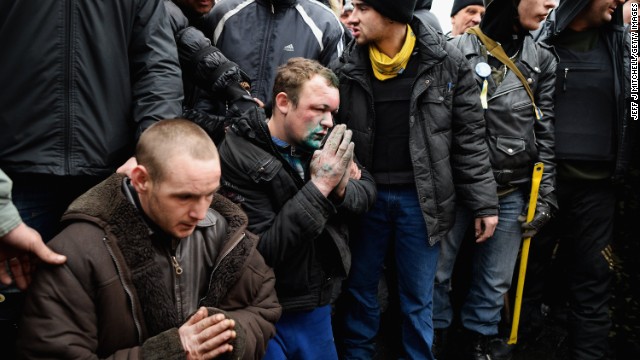 Two pro-government supporters are made to pray February 23 in front of a shrine to dead anti-government protesters.
Two pro-government supporters are made to pray February 23 in front of a shrine to dead anti-government protesters. 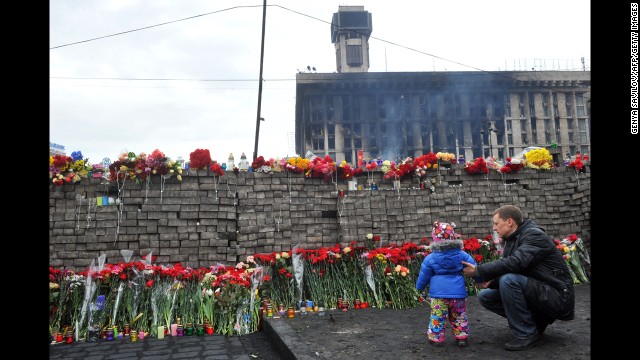 A man and his daughter lay flowers at a memorial for protesters killed in Independence Square.
A man and his daughter lay flowers at a memorial for protesters killed in Independence Square. 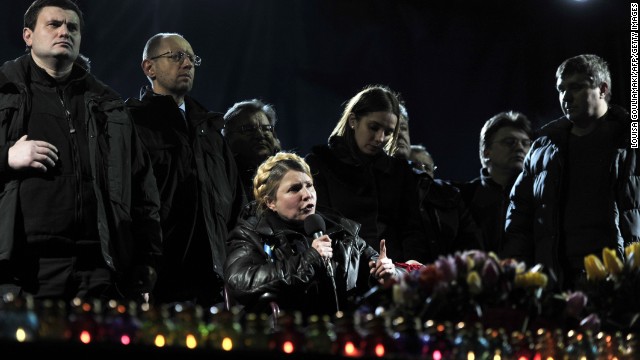 Former Prime Minister Yulia Tymoshenko speaks at Independence Square on Saturday, February 22, hours after being released from prison. Tymoshenko, considered a hero of a 2004 revolution against Yanukovych, was released after 2½ years behind bars.
Former Prime Minister Yulia Tymoshenko speaks at Independence Square on Saturday, February 22, hours after being released from prison. Tymoshenko, considered a hero of a 2004 revolution against Yanukovych, was released after 2½ years behind bars. 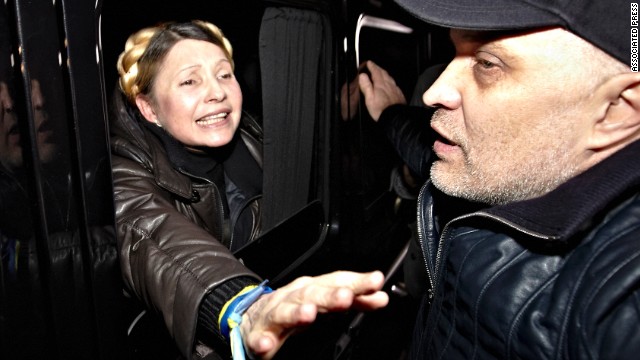 Tymoshenko is greeted by supporters shortly after being freed from prison in Kharkiv on February 22.
Tymoshenko is greeted by supporters shortly after being freed from prison in Kharkiv on February 22. 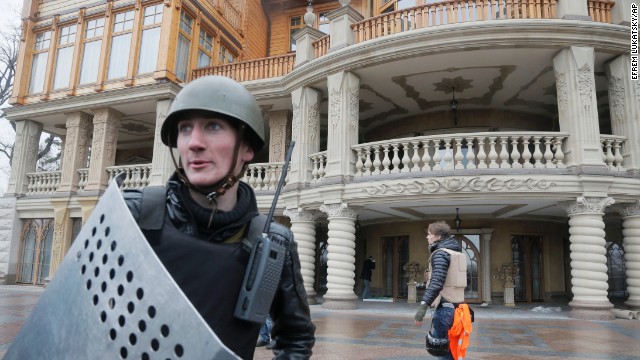 A protester guards the entrance to Yanukovych's abandoned residence outside Kiev on February 22.
A protester guards the entrance to Yanukovych's abandoned residence outside Kiev on February 22. 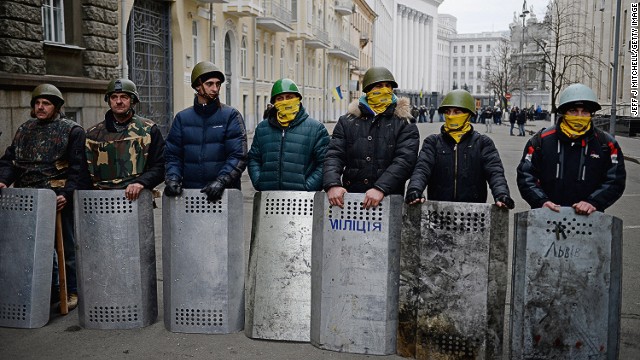 Anti-government protesters guard the streets next to the presidential offices in Kiev on February 22.
Anti-government protesters guard the streets next to the presidential offices in Kiev on February 22.  Anti-government protesters drive a military vehicle in Independence Square on February 22. Many protesters said they wouldn't leave the square until Yanukovych resigned.
Anti-government protesters drive a military vehicle in Independence Square on February 22. Many protesters said they wouldn't leave the square until Yanukovych resigned. 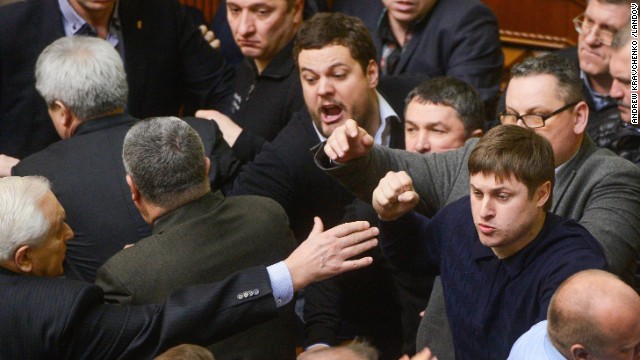 Ukrainian lawmakers argue during a session of Parliament on Friday, February 21.
Ukrainian lawmakers argue during a session of Parliament on Friday, February 21. 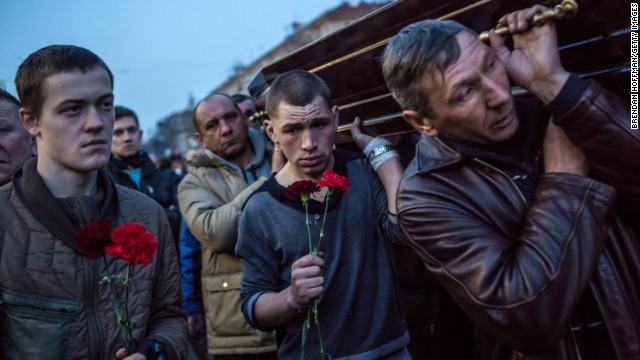 Men in Kiev carry a casket containing the body of a protester killed in clashes with police.
Men in Kiev carry a casket containing the body of a protester killed in clashes with police. 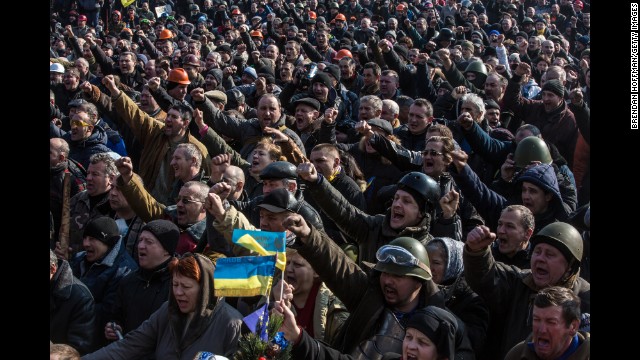 Protesters cheer after news of an agreement between the opposing sides in Kiev on February 21.
Protesters cheer after news of an agreement between the opposing sides in Kiev on February 21.  Photos: Crisis in Ukraine
Photos: Crisis in Ukraine  Madeleine Albright: Putin is delusional
Madeleine Albright: Putin is delusional  Putin speaks about Ukraine
Putin speaks about Ukraine 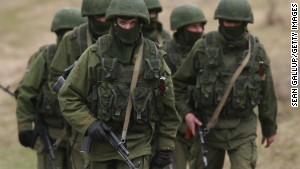 Putin and the question of sovereignty
Putin and the question of sovereignty  Squeezing Russia economically
Squeezing Russia economically What are U.S. options?
With Ukraine looking to reduce dependence on Russian energy, the United States will provide assistance and financing to help businesses find new export markets and will offer technical advice to the government on Ukraine's World Trade Organization rights with respect to Russia.
The assistance package comes as the United States considers economic sanctions against Russia, which one of the officials said could come within "days, not weeks."
U.S. moving fast on possible sanctions
The official spoke of a "solidification of Russian control of Crimea" and also referred to unconfirmed reports that Russian helicopters attempted incursions into Ukrainian airspace before Ukrainian planes chased them away.
In addition, the official discussed unconfirmed reports of forces massed on the isthmus separating Crimea from mainland Ukraine, sparking concern Russia wants to extend its forces to the Ukrainian mainland.
"We still have a very real concern that the Russians have other plans in Ukraine," a second official said.
Putin: Russia has no plans to annex Crimea
The officials emphasized the importance of de-escalating tension in the region and pointed to a diplomatic way out for Russia to address its concerns in Crimea through international monitors. The Organization for Security and Cooperation in Europe, a regional security bloc, sent in 10 monitors Monday, but the officials encouraged Russia to agree to a much larger observer mission.
Russia should also engage in a dialogue with Ukraine, the officials said. The United States hopes to convene a meeting of signatory countries of the 1994 Budapest Memorandum, a pact of security assurances signed by the United States, Britain, Ukraine and Russia -- as early as this week to begin that dialogue, but the officials said such a meeting was not yet scheduled.
"There is a way out for Russia," the first official said. "If Russia does not chose that off ramp, then the message from the administration is we are ready then to put in place more robust measures."
CNN Foreign Affairs Reporter Elise Labott reported from Kiev and Tom Cohen from Washington.

0 comments:
Post a Comment